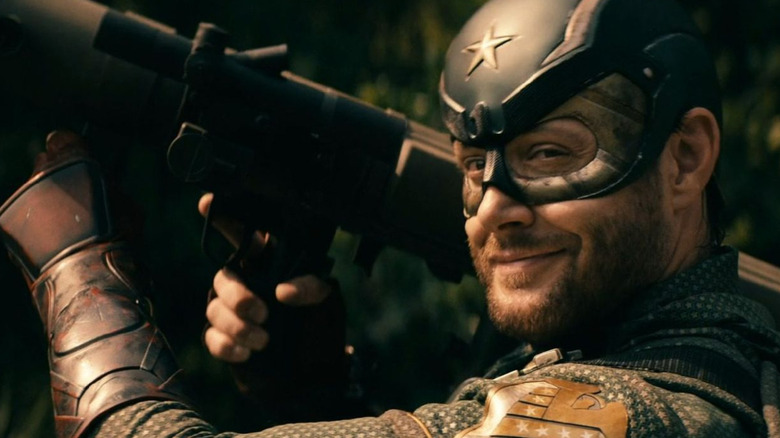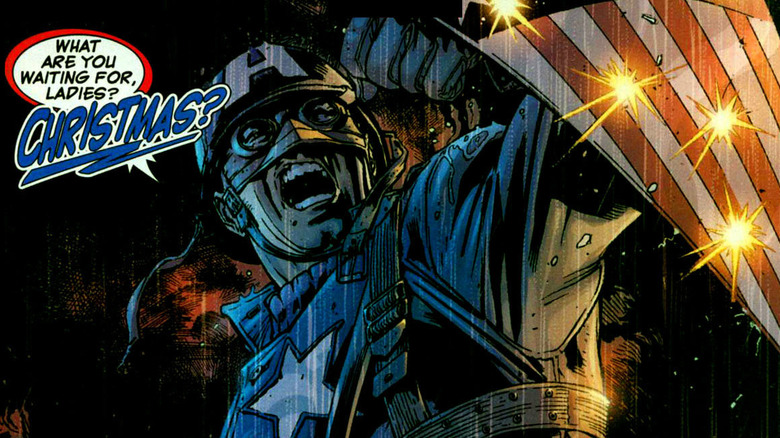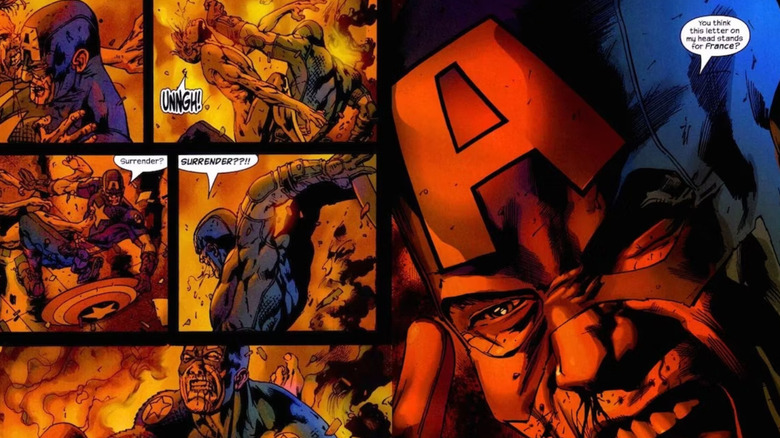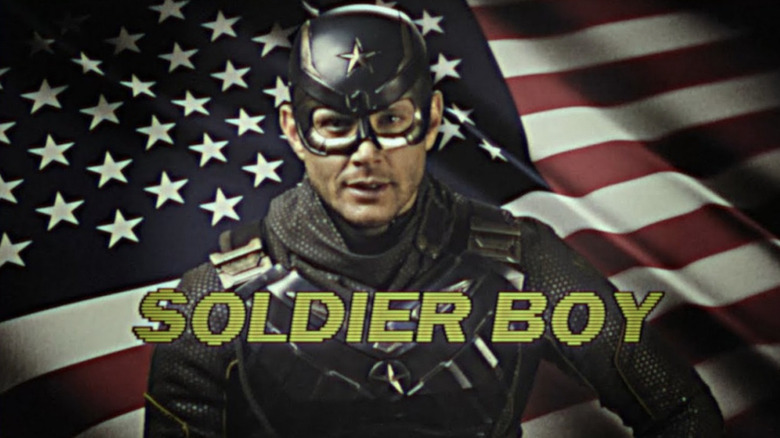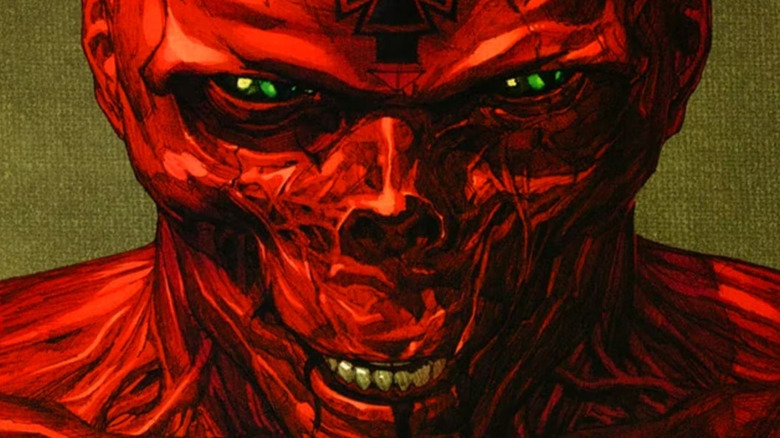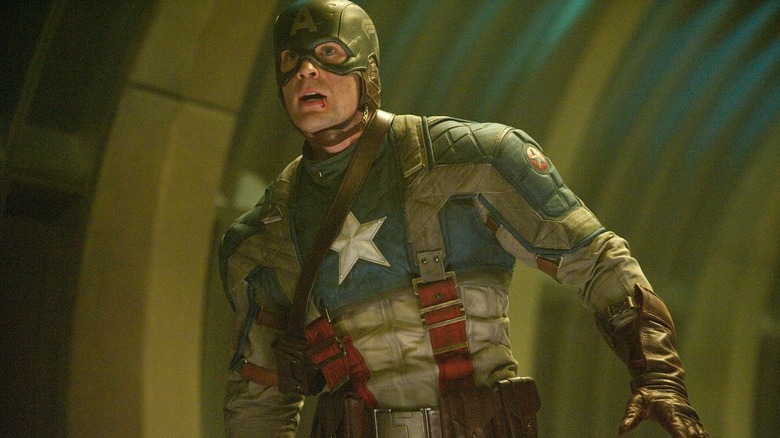Soldier Boy Is The Boys Season 3's Riff On An Infamous Marvel Character
This post contains spoilers for "The Boys" season 3.
This week marked a wrap on "The Boys" season 3, and the MVP of this season was definitely Soldier Boy (Jensen Ackles), the patient zero of Compound V and the first "Supe." Many of the super "heroes" on "The Boys" are analogs of popular ones owned by Marvel and DC, and Soldier Boy is one of the most blatant yet: a bald-faced parody of Captain America.
Soldier Boy gained his powers during World War II, has a militaristic/patriotic theme to his costume (colored army green with an eagle motif, versus Cap's red, white, and blue), wields a shield, and has woken up in modern times Rip Van Winkle-style. Unlike the egalitarian, fair-minded Cap, Soldier Boy is a chauvinistic bully whose patriotism is much more conservative. The point of Soldier Boy is to show what the "ultimate" American soldier would actually be like, and how culturally out-of-touch a man like that would be in the 21st century.
Interestingly, this sort of deconstruction of Captain America's character was already done with a version of the man himself in Mark Millar and Bryan Hitch's "The Ultimates," one of the more infamous comic runs of all time.
Superhero comics in the aughts
To understand "The Ultimates," you must understand the market and cultural conditions it was created under. In 1996, the comic book market crashed after many years of riding a high; Marvel was left near bankruptcy. Vice President Bill Jemas and Editor-in-Chief Joe Quesada decided they needed to attract new readers, and their solution was a reboot. Instead of wiping the slate clean as their distinguished competition had in 1986, "Ultimate Marvel" would run alongside the classic versions, complementing them instead of replacing them. If you'd like to know more about the history of this project, I'd recommend Abe Riesman's excellent breakdown of Ultimate Marvel's history.
"The Ultimates," the answer to the Avengers, was the third series to arrive after "Ultimate Spider-Man" and "Ultimate X-Men." Unlike those ongoing series, "Ultimates" ran as two successive, 13-issue mini-series from 2002-2004 then 2005-2007. The characters were as much deconstructions of the Avengers as updates.
Ultimate Captain America was a "might makes right" kind of guy, not to mention "old-fashioned" (read: casually bigoted). Subplots include his disdain for the "softness" of the 21st century and his relationship troubles with Janet Van Dyne/The Wasp. After all, their expectations of what a relationship entails are separated by generations.
Writers have often portrayed Captain America in a way that reflects the American zeitgeist. In the 1950s (before the "frozen in ice for decades" retcon in "Avengers" #4), Cap was rebranded a "Commie Smasher." In the post-Watergate 1970s, when many citizens were disillusioned with America, Steve Rogers shed the Captain America identity and became Nomad. It's no coincidence that the hard-edged Ultimate Cap came when a "cowboy" president was taking America abroad in search of monsters to destroy. Millar and Hitch's characterization of Cap was an indictment of America past and present.
Heroes for the Bush years
"The Ultimates" re-contextualizes the Avengers for a post-9/11 world. For one, the team is created by SHIELD to give the American security state its own superheroes (this would be aped for the MCU Avengers). Volume 2 sees the Ultimates deployed in the Middle East, culminating in the villains of the book being the Liberators, a multi-national superhuman team assembled by countries scared of America's lead in the genetic arms war.
"The Boys" debuted in 2006, months before "Ultimates 2" wrapped publication. Garth Ennis and Darick Robertson's comic is as much a post-9/11 comic as "The Ultimates"; in the comic's world, the superhero group The Seven failed to stop the attacks that day. Garth Ennis, who is not a fan of superheroes in general, is on record as particularly disliking Captain America:
"[The character is] borderline offensive, because to me the reality of World War II was very human people, ordinary flesh-and-blood guys who slogged it out in miserable, flooded foxholes. So adding some fantasy superhero narrative, that has always annoyed me a little bit."
This disdain carried over into the comic version of Soldier Boy, who is portrayed as a pathetic character. When he claims to be a war hero, Billy Butcher calls him a fraud who insults the memories of the real soldiers who died (echoing Ennis' views on Cap). However, the Soldier Boy seen in Prime Video's "The Boys" is closer to Millar's Captain America than Ennis' original parody.
Soldier Boy
A character literally called "Captain America" will always have nationalistic undertones, and "The Boys" leans into this. A newsreel of Soldier Boy's life in season 3, episode two shows him testifying before HUAC and posing with Ronald Reagan, while viral marketing shows he starred in "Just Say No" PSAs during the 1980s.
Episode six shows what Soldier Boy's biggest problem with the 21st century is: masculinity, or lack of it, "What passes as a man today, Christ on a cross." He's disgusted when he sees a commercial featuring a dad wearing a baby carrier, declaring, "Bill Cosby is America's dad and he wouldn't be caught dead in that p**** gear... the Cos, now there's a man. Holy s*** did he make some strong drinks."
There's more to this dark comedy than just showing how out of touch with the present Soldier Boy is. He presumably respects Cosby as the ideal of a family man, as many did before public revelations of the man's crimes. This is a frequent critique of toxic masculinity: how that patriarchal archetype harms the more vulnerable members of the family unit (as Hughie says, "A lot to unpack there").
Episode seven's closing twist is that Soldier Boy is Homelander's biological father. In the season finale, Homelander makes an impassioned plea for them to finally be a family. Soldier Boy rejects his son's emotional display: "Maybe if I'd raised you, I could've made you better and not some weak, sniveling p****, starved for attention, but there's no fixing that now."
Cap vs Soldier Boy
When Captain America stories explore him as a man out of time, they usually focus on the "his loved ones are gone" angle or more benign cultural differences. If his reactions to present America were ones that a white man from the 1940s would realistically have, it'd be harder for modern audiences to see him as a squeaky clean paragon. Ultimate Cap and Soldier Boy show why, because they do have those realistic reactions.
When Steve first awakens in "Ultimates #3," he thinks he's been captured by the Nazis. Why? There's no way that a Black man like Nick Fury, would have a rank as high as General in the American military. While Soldier Boy only missed out on 40 years instead of 70 like Cap, his views are no less stuck in the past. They share the same black-and-white view of things: as a good guy, it's their job to punch the bad guys, and they choose who the bad guys are.
Soldier Boy's connection to Homelander even mirrors a plot twist from the 2009 series "Ultimate Avengers" (by Millar and Carlos Pacheco). The Ultimate Marvel version of Cap's arch-foe, the Red Skull, is actually Steve Rogers' illegitimate son. Just like Homelander wants a real father with Soldier Boy, the Red Skull wants to use the Cosmic Cube to alter reality and give himself a normal childhood.
Is there anything that separates Ultimate Captain America from Soldier Boy? To be clear, Soldier Boy is even worse than Ultimate Captain America. He's abusive to his sidekick, Gunpowder, and his team, Payback (a clear spin on "the Avengers"). When Steve attacks his teammates (including Bruce Banner and the wife-beating Hank Pym), the comic gives him more justification for his actions than "The Boys" gives Soldier Boy for abusing his fellow heroes. and at least Ultimate Cap actually did fight in World War II — Soldier Boy just starred in some photo-ops and propaganda reels.
A good time to be in the superhero business
Since Soldier Boy is so similar to Ultimate Cap, a question emerges: If this sort of deconstruction of Captain America has been done before, is "The Boys" just treading old ground? Well, yes and no. The satirical elements of Soldier Boy's character aren't new, but they have renewed relevance in the 2020s. Plus, "The Boys" is reaching a wider audience than "The Ultimates" ever did.
Thanks to the Marvel Cinematic Universe, Captain America is a more widely known, culturally relevant character than he was when "The Ultimates" was published. So, it makes sense that a lampooning of his character is no longer confined to the relatively niche medium of comics themselves. It's the same reason that this current moment was the perfect time for an adaptation of "The Boys." Superheroes are at their cultural apex, and so they've never been easier, more deserving targets of satire than they are now. And that's doubly true for a hero claiming to represent America.
